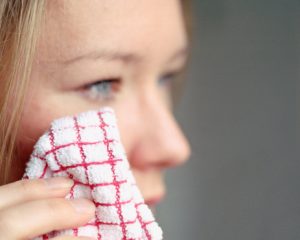 Do people always ask you, “Are you crying?” because your eyes are watering? Do your watery eyes impede your ability to do daily tasks? Are you annoyed by constantly wiping away tears?
Do people always ask you, “Are you crying?” because your eyes are watering? Do your watery eyes impede your ability to do daily tasks? Are you annoyed by constantly wiping away tears?
Your eyes water for several different reasons, including as a natural mechanism to remove debris and other threats that may enter your eye. For some, laughing or yawning can cause watery eyes or even staring at a bright light. These are all pretty normal and aren’t cause for concern, but for some, their eyes may overproduce tears, which can affect daily tasks.
Advertisement
Here are nine reasons your eyes may water and how you can treat it. Remember, though, if your watery eyes affect your vision or you notice a lump in or around your eye, you should see your doctor right away.
9 causes and treatments for watery eyes
Oil gland dysfunction: Our tears are also mixed with oil so that they don’t evaporate. If your oil-producing glands aren’t producing enough oil or not enough of the right quality oil, then your eyes will actually become dry. To compensate for this dryness, then your eyes will overproduce tears, thus continuing the cycle.
You can use a clean, hot towel over your eyelids in order to open up your oil glands. Gently massaging your eyelids is another way to boost oil production. Using a cotton swab, you can clear any debris along the lash line to remove anything that may be blocking your oil glands.
Dry eyes: As mentioned, if you have dry eyes, then your eyes will try to combat this by producing more tears. There are several reasons for dry eyes including autoimmune disease, so in order to treat this condition, you need to determine the underlying cause. Usually, a specialty eye drop can help.
Blocked tear ducts: If tear ducts are blocked, then tears begin to accumulate in the corner of your eyes. A tear duct can become blocked through infection, injury, and inflammation. Blocked tear ducts will usually resolve on their own, but if not, then your doctor may need to intervene by either prescribing medications to stop the infection or perform surgery.
Allergies: Allergies and cold watery eyes are often temporary, but a bother nonetheless. Taking an antihistamine can often relieve this symptom.
Conjunctivitis (pink eye): Along with a watery eye, your eye may itch, burn, become red, and be painful. Pink eye must run its course but don’t worsen it by touching your eye. You can obtain relief by placing a warm cloth over the eye. Your doctor may prescribe you specific eye drops.
Styes: A stye is a red dot that forms on the eyelid or lash line. Most styes are a result of an infection and can be painful. Some suggest that a stye feels like a pimple on your eye. Although not serious, styes are annoying and a warm compress can speed up healing. Avoid trying to pop the stye yourself as it can spread infection.
Cornea problems: Your cornea is your first defense against germs and dirt entering the eye, so if something irritates the cornea, it causes your eye to water as a means or removing the threat. Many cornea issues do not require medical attention, but if the condition does not go away, see your doctor to determine the cause.
Advertisement
Bell’s Palsy: When the nerves in the face become weak, it can impair blinking so your eyes become dry, and as we discussed, it leads to tearing. For some, Bell’s Palsy goes away on its own, but in the meantime, ensure your eye is well lubricated.
Other eyelid problems: There are other conditions that can cause your eyes and eyelashes to dry out, which can result in watery eyes. For some, these eyelid problems are a natural part of aging, but for others, it could be something more serious. If you are ever worried that your watery eyes are something more serious, don’t hesitate to speak to your doctor.
Related: How to stop watery eyes (epiphora)?
